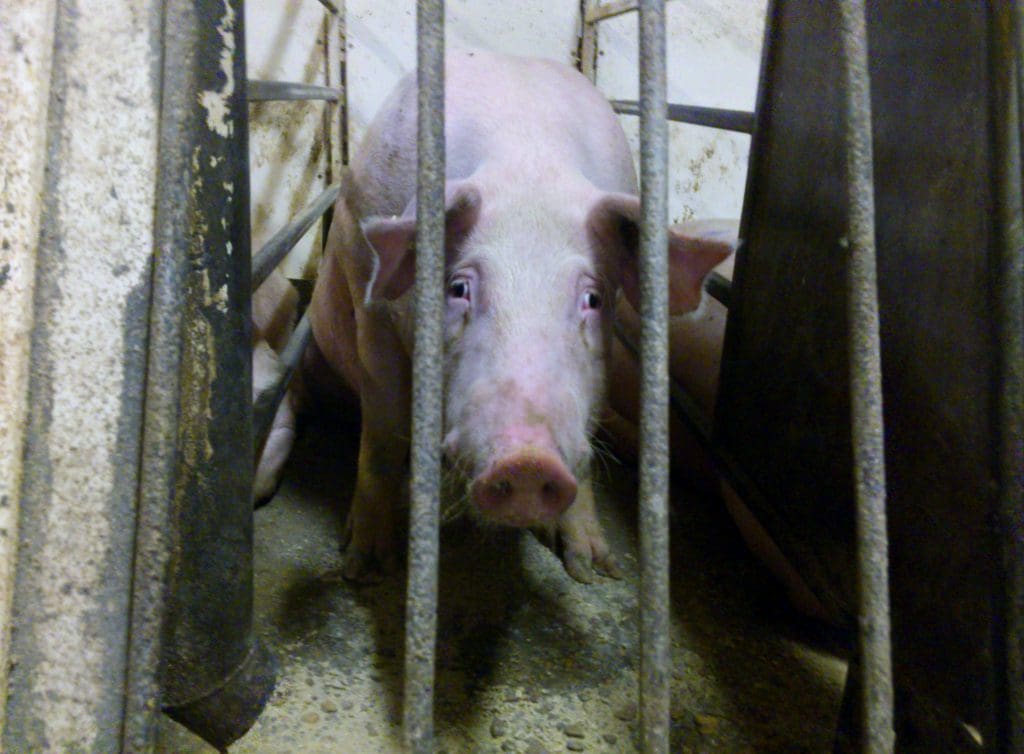
On a recent Saturday in Cloverdale, B.C., an Alzheimer centre held a birthday party. The party was not for one of the residents, but for a one-year-old “therapy pig” called Rosie.
Local press covered the celebration, quoting centre staff on the effect Rosie has on residents and their relatives who come to visit. “Not only has Rosie been hugely beneficial to the residents, but our staff, volunteers, families, they’ve all blended together to become a part of her life as well,” the centre’s program coordinator told the reporter.
The next day, local and national media were reporting on another story just a few miles away in Abbotsford. Animal activists were protesting at a hog farm in response to an undercover video allegedly showing neglected, sick and suffering pigs kept in filthy conditions.
The contrasting stories, one about a pig bringing joy to humans, the other about humans bringing misery to pigs, could not illustrate our collective cognitive dissonance about pigs more clearly. Are they just meat (cue the “Mmm, bacon” trolls) or are they more akin to our fabled best friend, the dog?
Scientific studies have suggested that pigs are as intelligent as dogs, although it has been argued that such comparisons are not very meaningful, especially in determining how an animal should be treated. If my border collie is smarter than your bulldog is he entitled to be treated with more kindness?
What really matters is sentience – the ability to experience sensations such as pain, pleasure or comfort. Neuroscientist Lori Marino, who appeared as an expert witness at the 2017 trial of an animal activist charged with mischief for giving water to pigs in transport trucks, testified that pigs are sentient beings and that “They have self-awareness, self-agency and have a sense of themselves within the social community… Each one is a unique individual.”
The suggestion that pigs feel emotion and have unique personalities would come as no surprise to anyone visiting a farm animal sanctuary. Diane Marsh, a co-founder of the Happy Herd Farm Sanctuary in B.C. tells the story of Betty the pig, who befriended a donkey who had mourned the loss of his horse buddy for two years, rejecting the company of other animals. She says they had an “instantaneous friendship” and now share food, graze together and sleep next to each other.
Imagine getting to know Rosie at the Alzheimer centre or Betty at the sanctuary. It would be heartbreaking for most people if the two were trucked away to a factory farm and sent for slaughter. Yet that is what happens to millions of pigs, each with a unique personality, every day. The only difference is that those nameless millions are unknown to us.
As people become more ethically uncomfortable with industrialized animal agriculture, some have sought so-called “happy meat” from more traditional farms offering better conditions for animals. Others, recognizing that this still leaves animals facing an unwanted, premature death, are turning away from meat altogether. And, as most meat in Canada comes from industrialized farms, this is the only realistic ethical choice.
The phenomenal rise of plant-based alternatives to meat has made it easier than ever to avoid animal consumption. The new products, competing on taste, price and convenience, are attracting considerable investment and proving popular with consumers around the world.
The environmental and health benefits of a plant-based diet have been major drivers of the demand for meat alternatives, boosting the efforts of animal advocates and bolstering their ethical arguments against animal consumption.
But for those who see pigs and other animals as fellow sentient beings and not mere commodities, the ethical arguments are enough. For them, a simple question provides its own answer: If one can eat well without the need for suffering and slaughter, why not? For them, every pig is a Rosie or a Betty – someone, not something.
